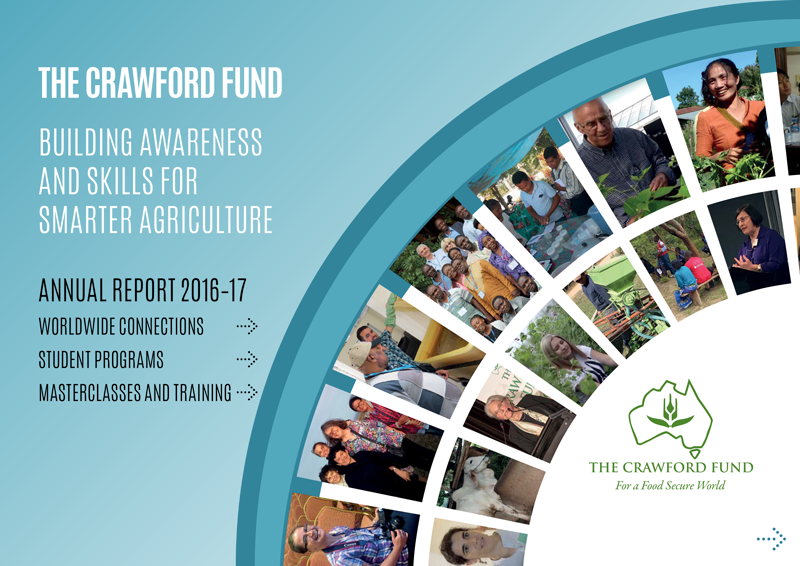

Building Awareness and Skills for Smarter Agriculture: Annual Report 2016-17
March 8, 2018
 Download the Crawford Fund Annual Report 2016-17
Download the Crawford Fund Annual Report 2016-17
A Smarter Focus
The next few decades will continue to pose challenges for agricultural producers in Australia and for our Indo-Pacific neighbours. Demand for food will increase as populations grow and diets change. While in Australia these challenges can present opportunities for our food producers and exporters, in many developing countries the ongoing challenge for smallholders will be to produce enough food to feed a growing population – and to feed people nutritiously, as opposed to simply filling bellies.
In Australia and overseas, pressure on already overstretched natural resources, including land, water and ecosystem services, will increase and will be exacerbated by the vagaries of climate change. To deal with the combined effects of these factors, agriculture has to become smarter and focus on emerging options, including sustainable intensification and climate-smart agriculture.
While the Crawford Fund is a small player in agriculture and overseas development, we can judiciously assist agriculture at home and abroad through targeted interventions aimed at building capabilities. We also aim to complement ACIAR’s programs by aligning the skills base of our ‘membership’ with areas that will benefit from assistance, and deliver this through specialist training, placement of mentors and Master Classes. Our target audiences include both scientists in developing countries, and young Australian scientists interested in careers in international development. We are increasingly committed to assisting the Australian private sector to better understand market access and biosecurity issues in order to increase the competitiveness of exporters.
A further important plank of our strategy is to ensure that politicians and the Australian public are aware of the overall benefits accruing to Australia from engagement in international agricultural R&D. We aim to do this through our annual conferences; submissions to Australian Government White Paper and enquiry processes, and varied interactions with the media.
In the past financial year, the Crawford Fund mounted a number of State- and Territory-run training courses, and ran Master Classes in genebank operations and advanced learning (in New Delhi, India) and agricultural research leadership and management (in Penang, Malaysia). We also supported over 40 young scholars to attend the 2016 Annual Conference in Canberra: ‘Waste not, want not: the circular economy to food security’. We supported a number of networking events organised by Researchers in Agriculture for International Development (RAID), which became a program of the Crawford Fund in 2016.
Submissions were also made to the Foreign Policy White Paper development process and the Senate Inquiry into National Security, emphasising the importance of agriculture as a basis for economic growth and social stability in developing countries. A further highlight was the ABC Landline TV program highlighting the benefits from Australian agricultural and forestry investment in Nepal, which we sponsored.
The Crawford Fund also prides itself on strong governance and the important role of its State- and Territory-based committees. As the incoming Chair and CEO, we would like to recognise the key leadership roles played by our previous Chair, The Hon. John Kerin AM, who retired in February 2017; and the previous CEO, Dr Denis Blight AO, who retired at the end of July 2017. Their stewardship has helped the Fund remain vibrant during testing economic times over the past several years.
Under their leadership, the Fund ended the most recent financial year with a small surplus and a sound financial basis for future innovation. A key task ahead for the Crawford Fund is the development of a new strategic plan that recognises the challenges described above, further identifies our niche, and defines specific goals and required outcomes. This will be available in the second quarter of 2018.
 |
 |
| The Hon. John Anderson (Chair) | Dr Colin Chartres (CEO) |




